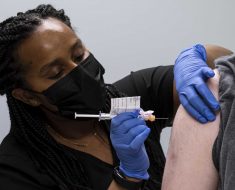Up to one in five millennials have no idea what STIs are despite as many as 30% being tested positive for them, reveals survey
- Some 20% of those aged 18-to-25 are either confused or clueless on STIs
- Believe STI tests are only necessary if people are suffering symptoms
- One in five millennials are too embarrassed to undergo an STI check up
- Some 75% of women never ask their partner if they have had a recent STI test
- GP says good sexual health is critical to making intimacy enjoyable
7
View
comments
Up to one in five millennials do not know what sexually transmitted infections (STIs) are, new research suggests.
Some 20 per cent of those aged 18-to-25 admit to either not fully understanding STIs, such as gonorrhoea and chlamydia, or being completely clueless as to what they are, a survey found.
This is despite 30 per cent of young people who get tested for STIs coming back positive, the research adds.
Zoe Bailie, director of brand at the under-25s London-based charity The Mix, which carried out the research, said: ‘We know young people have a lot to deal with and testing for STIs isn’t always the first thing they think about when it comes to their sex life.’
Ms Bailie adds, however, young people should be more aware of their sexual health and how antibiotics can treat certain STIs before they cause issues like infertility and brain damage.


Up to one in five millennials do not know what sexually transmitted infections are (stock)
-
 Mother, 28, had her tongue rebuilt with flesh from her ARM…
Mother, 28, had her tongue rebuilt with flesh from her ARM…  Kylie-Jenner obsessive had so much filler pumped into his…
Kylie-Jenner obsessive had so much filler pumped into his…  How poor care in NHS maternity units could be causing 600…
How poor care in NHS maternity units could be causing 600…  Ad watchdog probes contraceptive app that takes user’s…
Ad watchdog probes contraceptive app that takes user’s…
Share this article
HOW DOES MALE CIRCUMCISION PREVENT THE SPREAD OF HIV?
Male circumcision is the surgical removal of the foreskin, which is highly vulnerable to HIV infection.
This is due to the foreskin being delicate and therefore tearing easily during sex, which allows the virus to enter the body.
Tears also cause inflammation, which can further increase the risk of HIV transmission.
There is also a higher concentration of cells, known as Langerhans, in the foreskin, which is what HIV tends to infect.
HIV-infected fluids can also become trapped under the foreskin and remain there after intercourse.
The World Health Organization recommends voluntary adult male circumcision as a method to prevent HIV transmission in places where its prevalence is more than 15 per cent.
Male circumcision reduces heterosexual men’s risk of HIV by up to 60 per cent but does not protect women or homosexual males.
Source: Catie
One in five are too embarrassed to get tested
Results of the 1,012-people survey, which was conducted as part of the charity’s ‘Getting Some? Get Tested’ campaign, further suggests many millennials believe STI check ups are only necessary if people suffer symptoms, despite many infections being ‘silent’.
Some 44 per cent feel there is no need for such check ups due to them only ever having protected sex, while 20 per cent are too embarrassed to visit a sexual-health clinic.
Communication appears to be key with 53 per cent of millennials saying they would get tested if their partner asked them to, however, three quarters of women say they would never query if their other half had the all clear.
This is compared to 50 per cent of men who ask about their partners’ STI statuses before getting intimate.
‘Pop culture encourages short-term sexual relationships’
Speaking of the results, south-London GP Dr Martin Godfrey, said: ‘Being young is all about experimenting and having fun, including when it comes to sex.
‘Pop culture may be seen to encourage short-term sexual relationships without talking about protection and STIs, which can put young people at risk.
‘With most STIs being symptomless, young people need to get tested to be sure they don’t have an infection and don’t put their partners at risk.
‘Getting tested for STIs is about keeping your sex life healthy (so it stays fun) and supporting positive sexual experiences .’
Syphilis and gonorrhoea have increased by over 20% due to ‘condomless sex’
This comes after figures released last month suggested cases of syphilis and gonorrhea increased by more than 20 per cent in the past year.
Syphilis, which can be life-threatening if it severely damages the brain, heart or nervous system, incidences rose by 20 per cent from 5,955 in 2016 to 7,137 in 2017, according to a report by Public Health England (PHE).
Gonorrhoea, which can cause pregnancy complications and infertility, increased by 22 per cent from 36,577 cases in 2016 to 44,676 in 2017, the data adds.
As well as increased testing, PHE previously said ‘high levels of condomless sex probably account for most of this rise’.
Source: Read Full Article





